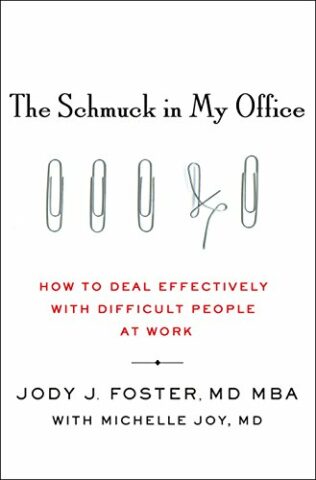What if you’re the schmuck?
When you consistently have problems collaborating with someone at work, it’s important to take a long, hard look at yourself. What is your role in the problem? How are you shaping and contributing to the situation? And what can you do to foster healthier, better functioning work relationships moving forwards – even remotely?

The Schmuck in My Office: How to Deal Effectively with Difficult People at Work
Jody Foster et Michelle Joy (St. Martin’s Press, april 2017)
1. Go take a look in the mirror – now!
When people exhibit problem behaviors, they don’t tend to realize it – otherwise, they would stop. Don’t fool yourself: you too probably unknowingly engage in disruptive behaviors. To identify and rectify when and where you err, learn how to turn your critical gaze inwards. Two obvious signs that it’s time for you to run-not-walk to the mirror are:
· Constant problems with others begs the question if maybe, just maybe, the problem might be with you and not everyone else?
· Intense emotional response to a certain behavior or individual is a red flag that you might have personal issues with this problem, rather than it posing a big issue for the office at large. If someone at work really, really bothers you, maybe it’s because they remind you of difficult aspects of your mom or dad? Or perhaps you yourself are more similar to your problem colleague and their dysfunctional behavior than you realize?
· Consistent issues with people who are different from you – for example, a consistent inability to work well with women – suggests that the problem could have more to do with close-mindedness on your part than anything to do with them. “Guard against labeling people ‘dysfunctional’ or ‘disruptive’ who are actually just different than you,” Foster warns.
2. Develop your capacity for empathy
Your ability to sense the emotions of others and imagine what they might be thinking or feeling is critical to building high functioning work relationships. This ability is called empathy. Leadership consultant Anne Loehr reports in the Huffington Post that, contrary to the received wisdom, “Empathy is not a ‘you either have it, or you don’t’ quality in human beings. Unless you have experienced a particular brain trauma, you have the ability to be empathetic. And so does that rude team member of yours!” Develop your capacity for empathy by practicing the following 5 actions:
© Copyright Business Digest - All rights reserved




